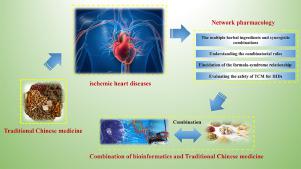Phytomedicine ( IF 6.7 ) Pub Date : 2022-06-12 , DOI: 10.1016/j.phymed.2022.154268 Hua-Yi Yang 1 , Men-Lan Liu 2 , Pei Luo 1 , Xin-Sheng Yao 3 , Hua Zhou 4

|
Background
The field of network pharmacology showed significant development. The concept of network pharmacology has many similarities to the philosophy of traditional Chinese medicine (TCM), making it suitable to understand the action mechanisms of TCM in treating complex diseases, such as ischemic heart diseases (IHDs).
Purpose
This review summarizes the representative applications of network pharmacology in deciphering the mechanism underlying the treatment of IHDs with TCM.
Methods
In this report, we used “ischemic heart disease” OR “coronary heart disease” OR “coronary artery disease” OR “myocardial ischemia” AND (“network pharmacology” OR “systematic pharmacology”) as keywords to search for publications from PubMed, the Web of Science, and Google Scholar databases and then analyzed the representative research reports that summarized and validated the active components and targets network of TCM in improving IHDs to show the advantages and deficiencies of network pharmacology applied in TCM research.
Results
The network pharmacology research indicated that HGF, PGF, MMP3, INSR, PI3K, MAPK1, SRC, VEGF, VEGFR-1, NO, eNOS, NO3, IL-6, TNF-α, and more are the main targets of TCM. Apigenin, 25S-macrostemonoside P, ginsenosides Re, Rb3, Rg3, SheXiang XinTongNing, colchicine, dried ginger-aconite decoction, Suxiao Xintong dropping pills, Ginseng-Danshen drug pair and Shenlian and more are the active ingredients, extracts, and formulations of TCM to ameliorate IHDs. These active compounds, extract, and formulations of TCM treat IHDs by delaying ventricular remodeling, reducing myocardial fibrosis, decreasing reactive oxygen species, regulating myocardial energy metabolism, ameliorating inflammation, mitigating apoptosis, and many other aspects.
Conclusions
The network pharmacology supplies a novel research exemplification for understanding the treatment of IHDs with TCM. However, the application of network pharmacology in TCM studies is still at a superficial level. By rational combining artificial intelligence technology and network pharmacology, molecular biology, metabolomics, and other advanced theories and technologies, and systematically studying the metabolic process and the network among products, targets, and pathways of TCM from the clinical perspective may be a potential development trend in network pharmacology.
中文翻译:

网络药理学为理解中医药治疗缺血性心脏病提供了系统的方法
背景
网络药理学领域发展显着。网络药理学的概念与中医哲学有许多相似之处,使其适合理解中医治疗复杂疾病的作用机制,例如缺血性心脏病(IHDs)。
目的
本综述总结了网络药理学在破译中医药治疗 IHD 机制中的代表性应用。
方法
在本报告中,我们使用“缺血性心脏病”或“冠心病”或“冠状动脉疾病”或“心肌缺血”和(“网络药理学”或“系统药理学”)作为关键词来搜索来自 PubMed 的出版物, Web of Science 和 Google Scholar 数据库,然后对代表性研究报告进行了分析,总结和验证了中医药在改善 IHD 中的活性成分和靶点网络,以展示网络药理学应用于中医药研究的优势和不足。
结果
网络药理学研究表明,HGF、PGF、MMP3、INSR、PI3K、MAPK1、SRC、VEGF、VEGFR-1、NO、eNOS、NO3、IL-6、TNF-α等是中药的主要靶点。芹菜素、25S-大香果苷P、人参皂甙、Rb3、Rg3、蛇香心痛宁、秋水仙碱、干姜附子汤、速消心痛滴丸、人参丹参药对、参连等是中药的有效成分、提取物和剂型改善 IHD。这些中药活性化合物、提取物和制剂通过延缓心室重构、减少心肌纤维化、减少活性氧物质、调节心肌能量代谢、改善炎症、减轻细胞凋亡和许多其他方面来治疗 IHD。
结论
网络药理学为了解中医治疗 IHD 提供了一个新的研究范例。然而,网络药理学在中医研究中的应用还停留在肤浅的层面。将人工智能技术与网络药理学、分子生物学、代谢组学等先进理论和技术合理结合,从临床角度系统研究中药的代谢过程和产品、靶点、通路之间的网络,可能是潜在的发展趋势。在网络药理学。











































 京公网安备 11010802027423号
京公网安备 11010802027423号